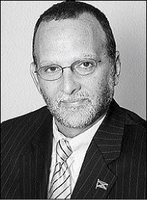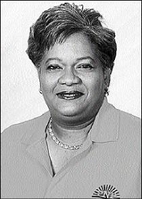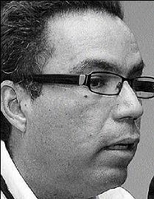The constitutional rights of dual citizens
Published: Sunday | June 28, 2009

JONES
A colleague, writing in another newspaper, repeatedly stated that Douglas Vaz and Gregory Mair were disqualified and unseated because they were dual citizens. It isn't as simple as that; and I beg to disagree because as a layman I can find no law that disqualifies anyone from membership in Parliament because he/she happens to be a dual citizen.
As I understand it, the argument was about a candidate being "under any acknowledgement of allegiance, obedience or adherence to a foreign power or State; by virtue of his own act." It is not about being a dual citizen, because it is quite possible for a person to be a dual citizen and yet not by virtue of his own act.
In spite of the ruling of the Supreme Court, I have always held that Section 40 of the Constitution does not apply to persons holding dual citizenship by accident of birth or by the act of a parent. I believe it was meant for adults who of their own volition (by virtue of his own act) declared allegiance to a foreign power; and from what I have heard, neither Vaz nor Mair ever made such a declaration. They had no cause or need to do so.
equal rights and justice

MAIR
I understand that Sharon Hay-Webster has said that she swore allegiance to Jamaica after being born in the United States. I suspect that she was never required to do any such thing. She, like Mair and Vaz, had Jamaican citizenship from the day she was born.
Some observers have lost sight of the fact that the Jamaica Constitution recognises dual citizenship as lawful and acceptable. Chapter II makes it clear that Vaz and Mair and perhaps Hay-Webster automatically qualified as dual citizens - Vaz, because he was born in Jamaica of an American mother; and Mair, because his parents took that step when he was a minor. Neither man got that status "by virtue of his own act".
In the 100 or so democratic countries that permit citizens to have dual nationality, the persons with that status are accorded equal rights, equal responsibilities and equal justice in both territories. The proviso is that the Jamaican-American enjoys these privileges and obligations in only one country at a time. While in Jamaica, he/she is governed by Jamaican laws and cannot appeal to the US for protection of any sort. In America, the same condition applies - the dual citizen cannot lawfully use the Jamaican cover while living in the US.
The Jamaica Constitution gave full rights and civic responsibilities to Dual Citizen Vaz from the very day of his birth. The American Constitution accorded him similar rights for which he automatically qualified. In the case of both countries, one of these entitlements is the right to hold and use a passport. Since in a democratic country these rights cannot be abridged or restricted, except where the individual is a certified criminal or a person of unsound mind, I need to be shown the source that empowers any individual or institution to remove or interfere with any of those rights.
In the specific case, Vaz was disqualified from membership in the House because he used his American passport after he had reached the age of maturity. The implication is that upon reaching manhood he was required to give up his dual status or be deprived of one of his most important rights in Jamaica. This is a condition that is contrary to the internationally accepted principles of dual citizenship; and in effect it makes Jamaica the first and perhaps only country that recognises dual citizenship, but has rules that force the dual citizen to give up his lawful and democratic rights.
The right to elect and be elected is a democratic right. It is also a fundamental human right and should be so regarded by Jamaica, a country that worked hard to win universal adult suffrage. International standards insist that true democratic elections provide guarantees of universal and equal suffrage to each adult citizen who is not a convict or a mental case; and Jamaica now finds itself among a dwindling group that punishes its citizens for widening their vistas.
Those Jamaicans who would use faithfulness to the Constitution as sole proof of loyalty and devotion should be reminded that the British who helped shape this 'sacred document' for us have no written Constitution of their own. Further, they do not bar dual citizens from their electoral process. Any citizen can stand as a candidate in a British general election, so long as he meets the requirements of the Electoral Office; and these restrictions relate to the minimum age and whether the candidate is a member of the House of Lords or holds office in certain government departments. Undischarged bankrupts and criminals may also be disqualified.
Nearly 20 years ago the European Commission for Democracy through Law, also called the Venice Commission, was set up as the Council of Europe's advisory body on constitutional matters. Composed of "independent experts who have achieved eminence through their experience in democratic institutions", it has become an internationally recognised indepedent legal think tank that provides "constitutional first-aid" to individual states. Its members are senior academics, particularly in the fields of constitutional or international law; supreme or constitutional court judges or members of national parliaments.
In 2007, the Commission and the Office for Democratic Institutions and Human Rights issued a joint statement on the recommended Code of Good Practice in Electoral Matters. It said in part:
"Universal suffrage covers both active (the right to vote) and passive electoral rights (the right to stand for election). The right to vote and stand for election may be subject to a number of conditions ... The most usual are age and nationality ..."
may be problematic


From left Hay-webster and Vaz - File photos
By nationality, the Code of Good Practice means requirement on citizenship. It states that citizenship requirements may be problematic if the State withholds it from persons who have resided in the territory for generations. The Code of Good Practice also states:
"Furthermore, under the European Convention on Nationality persons holding dual nationality must have the same electoral rights as other nationals."
Referring to states that deny dual citizens the right to stand for election the report said: This is against the Code of Good Practice. The Venice Commission has stated previously that restrictions on the right to vote, both active and passive, should be abolished. Once the right to dual citizenship has been accepted, citizens with dual citizenship should not have fewer rights than other citizens."
I raise these matters to indicate the world's inexorable movement towards full acceptance of dual citizenship as part of globalism. Also, I point to the need for early and decisive action to bring our Constitution and election system into the 21st century. An early compromise between the contending elements of parliament may save taxpayers the time and money spent on by-elections. However, it is also necessary that we recognise that however faithful we might be to this confusing Constitution, a foolish consistency is something ill-advised. It is, as Ralph Waldo Emerson once wrote, "... the hobgoblin of little minds; adored by little statesmen, philosophers and divines".
